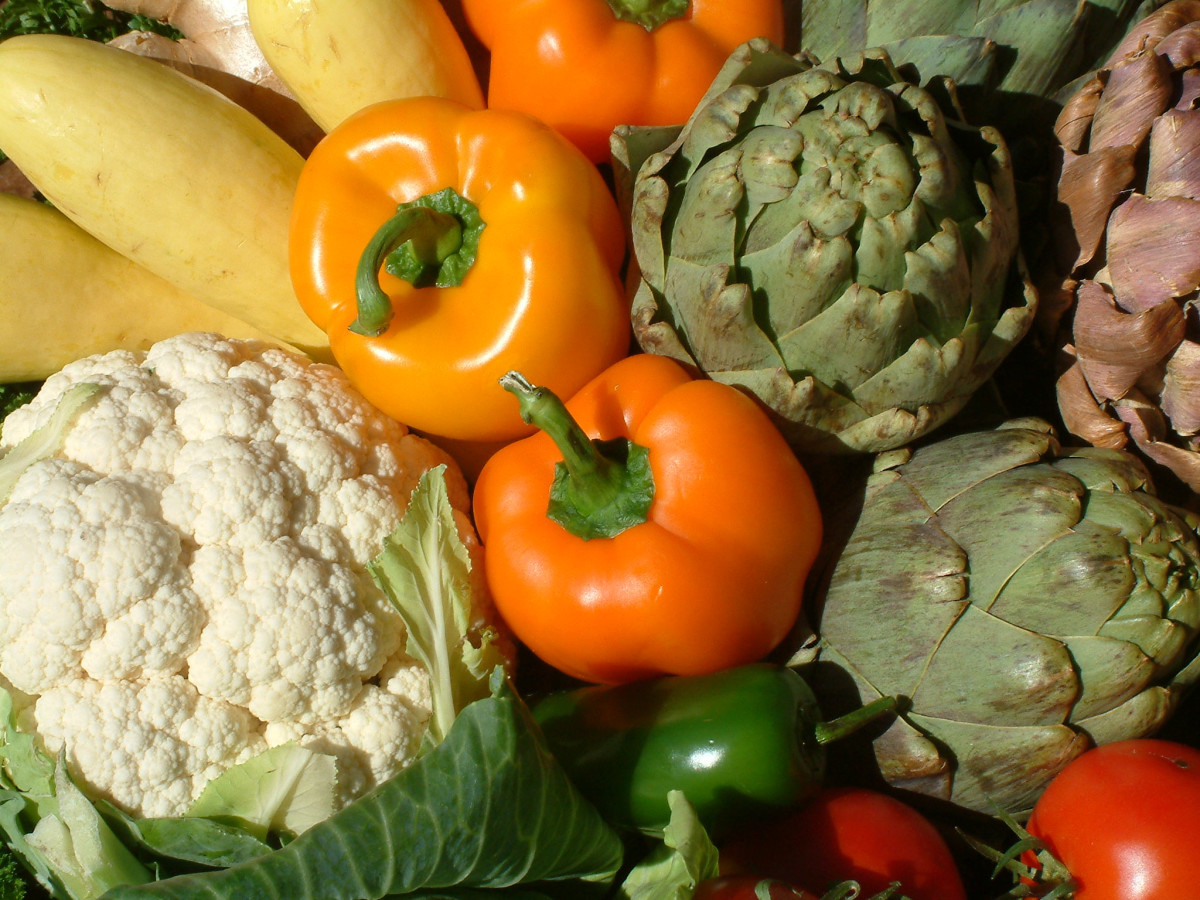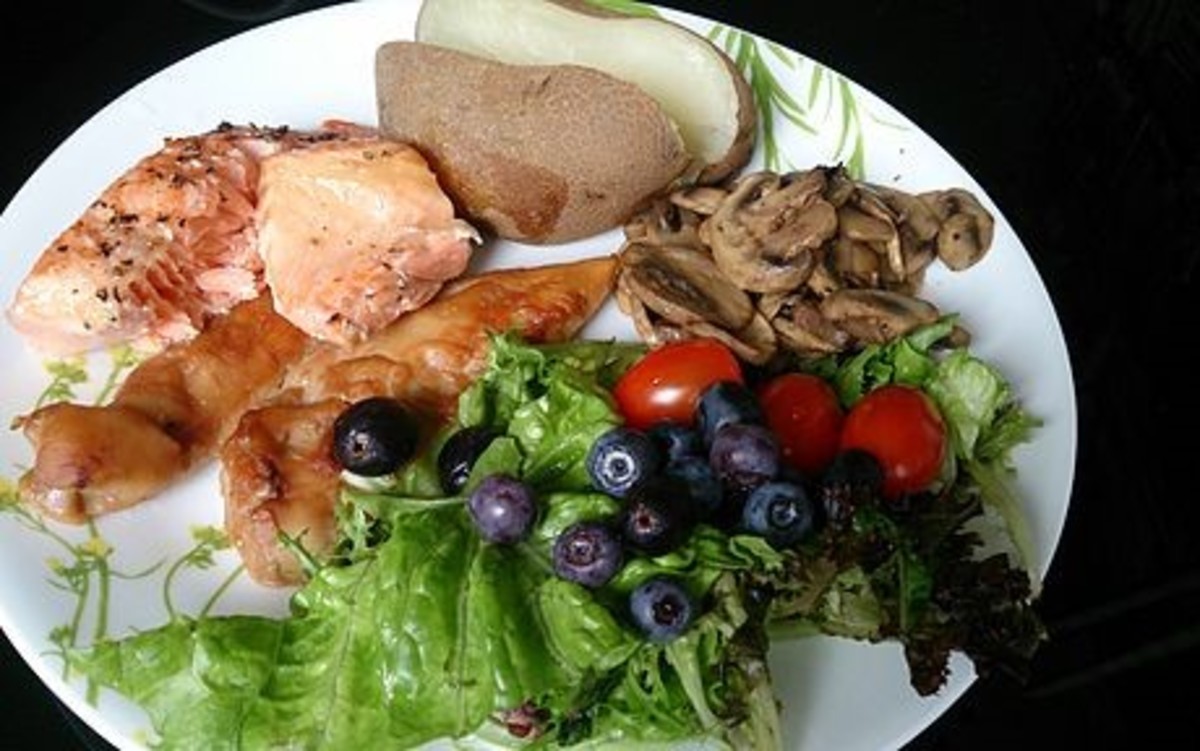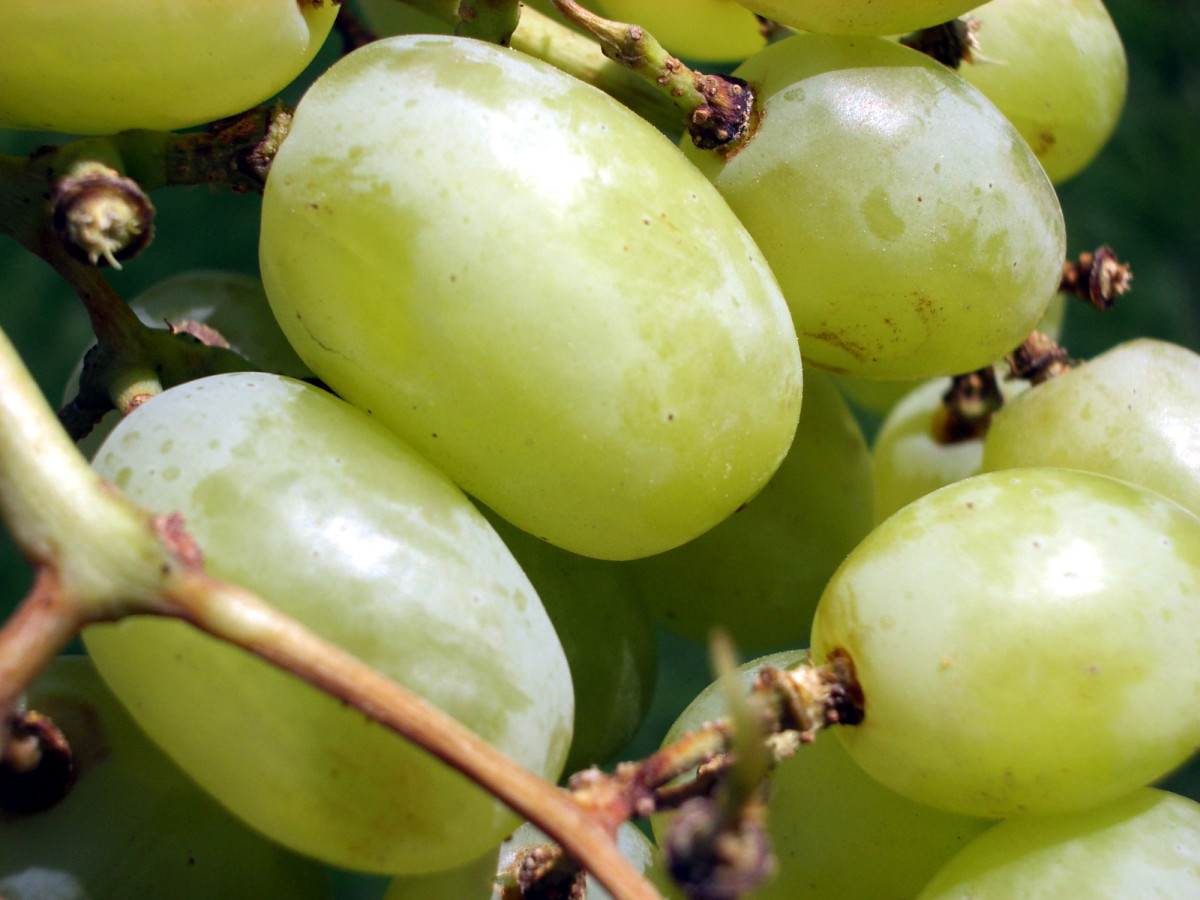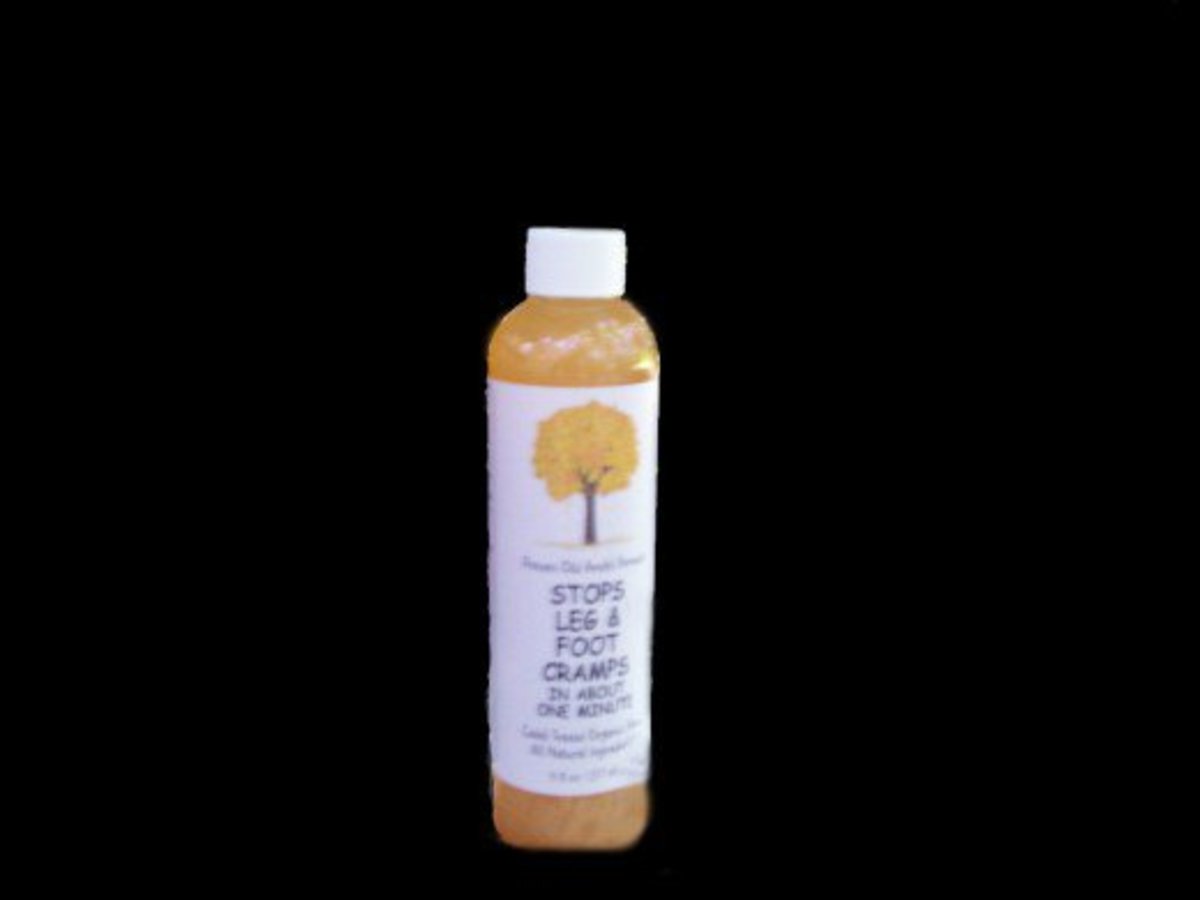Problems with a Vegetarian Diet
The main problem with vegetarian diet is how some people are implementing it. Some people on vegetarian diets are either consuming too many processed carbohydrates or too much soy or both.
This is not to say that all vegetarians run into these problems. Only some of them. Just as there can be healthy eating omnivores and non-healthy eating omnivores, there are healthy eating vegetarians and non-healthy vegetarians.
Some vegetarians know how to implement a healthy vegetarian diet. The purpose of this article is to point out some possible pitfalls and how to implement it in a healthful manner.
When implemented correctly, a vegetarian diet can be a healthful diet. To implement correctly, one has to eat whole natural plant-based foods and lots of it in order to get enough protein. It helps to include eggs if one does not have any sensitivity to them. With eggs, you get the important DHA omega-3 fatty acid and the vitamin B12 -- both of which is quite lacking in the plant world.
Vegans who do not eat eggs or dairy because they are animal products should consider supplements of DHA and B12.
Why Might One Want to Add in Some Animal Products
The motivation of vegetarianism in terms of improved health and saving the planet and not using other animals as food is respectable. However, after looking at nutritional science and how the body works, it appears that the human body does benefit by adding in some healthy animal products.
For many who start a vegetarian diet, it may work great and they feel great. And at first it can be quite healthy when done correctly. However, for many individuals, the health problems of lack of animal products often do not show up until years on a vegetarian diet. Keep in mind also that each person has a unique biochemistry where certain genetics are more suited for vegetarianism. And for certain people with certain genetics may have a greater requirement for animal proteins.
This article will look at what some experts have said about how a vegetarian diet may not be ideal for some individuals. This is by no means an argument against vegetables. In fact, people should be eating more vegetables. Ideally, one should have vegetables covering at least 50% of your plate at every meal. One might also consider adding small amount of animal product into the diet, especially eggs and seafood. Dairy might be fine for some individuals, but for some dairy does have some negatives as mentioned in my other article.
1. Too Much Processed Carbohydrates
The first problem with going vegetarian is that people often go for higher amounts of unhealthy processed carbohydrates. This includes a lot of bread, pasta, and pizza. Such carbohydrates processed from wheat contain gluten of which some individuals are sensitive to. Gluten is a protein in wheat that is quite difficult to digest even for healthy individuals.
It is better is to consume whole natural carbohydrate foods, rather than processed carbohydrates. For example, rice and potatoes. And even healthier is squash and sweet potatoes -- all of which are gluten free in their natural state (as long as you don't drown them in commercial sauces and dressings which often contains gluten).
High amount of starchy carbohydrates turns into sugar (which is unhealthy in excess). It spikes blood sugar and insulin which is obviously not good for diabetics.
2. Too Much Soy
Another unhealthy route that people get into is the consumption of "fake meats" and "fake milk". They are vegetarian "meats" which looks like meat, but do not contain animal products. It is almost as if one is attempting to come up with a vegetarian substitute of something they wish they could eat. If the body is craving meat, then perhaps it is healthier to eat the real thing constructed by nature, rather than some fake meat constructed in a food lab.
The problem with "fake meats" is that they are highly processed and often contain a lot of soy.
Vegetarian refers to someone who does not consume animals, but do consume animal products such as eggs and milk. Vegans do not consume animals nor animal products. So they will often consume soy milk. This is milk not made from the milks of animals, but from the milk of the soy beans. Soy beans do not contain milk. Soy milk are constructed by isolating the soy protein from the plant and making it look like milk. It is "fake milk".
In article, The Dark Side of Soy, author Mary Vance Terrain wrote how she developed a problem with soy after years of consuming it on a vegetarian diet. The article says that soy milk is ...
"A processed beverage made of ground soybeans mixed with water and boiled, which removes some toxins. Sugar is added to improve flavor. An eight-ounce serving contains up to 35 milligrams of isoflavones, which may change estrogen levels and hormonal function."
And it is true, excessive soy can produce hormonal changes and have estrogenic properties. Soy milk should not be consumed by children who are undergoing hormonal changes and still developing. And they should never be given to babies.
Soy is among the foods that people can develop a sensitivity to. Other foods are wheat (ie gluten), corn, eggs, dairy, nuts, and shellfish.
Even if one knows not to consume imitation meats and imitation milk, one may over-consume tofu (which is soy) thinking that it would provided the needed protein lacking in a vegetarian diet.
The healthy soy products are the fermented soy such as miso, natto, and tempeh. Occasional edamame is fine too. Learn more in the article Is Soy Healthy?
3. Not Enough Complete Proteins
The book Digestive Health with Real Food writes ...
"The truth is that vegetarian sources of protein, such as beans, lentils, soy, and nuts, can be very hard to digest, especially for an already-impaired digestive tract. The proteins in soy are highly allergenic, while beans and lentils are high in FODMAPs and starches that can feed a bacterial overgrowth. Animal protein is a safer, superior option ..." [page 114]
In Nora Gedgaudas’s talk at the Ancestral Health Symposium, she mentions that vegetarian, vegan, or very high carb diets may lack sufficient complete protein source to have enough raw amino acids to build neurotransmitters.
In her book Primal Body, Primal Mind, she writes ...
"Far and away, the people with the most damaged and intractably dys-regulated brains and nervous systems I have seen or dealt with in my practice have all been vegans, with strict vegetarians a close second - hands down." [page 224]
Dr. Tom O’Bryan say similarly in an Underground Wellness podcast linked here. In about 64 minutes into the podcast, he says ...
"The sickest people I see sometimes are vegetarians. And it is because they are eating on philosophical beliefs and not physiological needs."
He says that if someone is going to be a vegetarian, it can be done. But it takes a lot of work and knowledge. You have to know how to balance the proteins and look at amino acid compositions and understand the different biological value of proteins. Egg (sometimes called the perfect food) for example its biological value is 100%. That means all its protein is biologically available. For beans, 40 to 45% of its protein is biologically available. That is why vegetarians are a bit better off because they can eat eggs; while vegans do not.
In an interview between Dr. Mercola and Dr. Cousens, Dr. Mercola believes that there are some people of the "high protein type" that will require animal source of protein on a regular basis. Dr. Cousens feels that a 100% plant-based diet can be done, but that you need to be more diligent about food choices and how to get the necessary protein (he seem to like the therapeutic use of Spirulina and chlorella and bee pollen for certain individuals that need a greater amount of protein). Cousens also says that B12 deficiency is a problem for both plant only people and meat eaters (but less so for meat eaters). His thoughts on not having complete proteins in a food source is that the liver can store amino acids and call them up when needed. Both Dr. Mercola and Dr. Cousens believes in exercise and eats shortly after exercise.
On the other hand, Vicky Newman in this youtube says that while vegetables are not a great protein source. But if you balance them with complementary proteins within a few hours time span, then you should be fine.
A study linked here suggests that a vegetarian diet is associated with an elevated risk of depressive and anxiety disorders. This could be due to the diets being sub-optimal in DHA omega-3 fat for the brain, zinc, selenium, and proteins with complete essential amino acids.
In The Heart Revolution, Dr. Kilmer McCully writes
"depending only on plant for protein is not a good idea because the protein is inferior. I would suggest getting two to three servings of protein from meats, fish, poultry, eggs, or cheese, every day." [page 38]
In a Hawthorn University webinar linked here, Marcelle Pick says that people with adrenal fatigue needs to have good protein source at every meal (more than what can be obtained from plants).
The human body requires nine essential amino acids ...
- tryptophan,
- threonine,
- isoleucine,
- leucine,
- lysine,
- methionine+cystine,
- phenylalanie+tyrosine,
- valine, and
- histidine
Since the body can not manufacture these, this means that we have to get these amino acids from foods.
Ideally we also need to consume arginine, cysteine, glycine, glutamine, histidine, proline, serine and tyrosine from foods because our body can only synthesize these in limited amounts. These are called "conditionally essential" amino acids.
Go and look up the various plant and animal foods in the nutritional database here. It will tell you the protein quality score and the mix of protein amino acids of the various foods. Score of 100 or above means the food contains "complete protein".
According to Wikipedia, a complete protein is ...
"a source of protein that contains an adequate proportion of all nine of the essential amino acids necessary for the dietary needs of humans or other animals. Some incomplete protein sources may contain all essential amino acids, but a complete protein contains them in correct proportions for supporting biological functions in the human body. ... Though some vegetable sources of protein contain sufficient values of all essential amino acids, many are lower in one or more essential amino acids than animal sources, especially lysine, and to a lesser extent methionine and threonine."
Vegetables do contain protein and many do contain all of the essential amino acids. However, they do so in lesser quantities than in meat. To get enough of all of the essential amino acids, you have to eat a lot of vegetables. When on a vegetarian diet, it helps to mix and match the various proteins in plant and beans in order to consume the full spectrum of essential amino acids.
In order to consume enough amino acids, nine cups of vegetables and fruits each day would be ideal. Some vegetarians are not eating sufficient quantities or diversity of vegetables and legumes to meet their needs. Also because vegetables are lower in calories, active individuals may not be getting enough calories for their needs.
Because of the higher protein content in meat, it is much easier to meet one's protein and caloric needs. Meat and seafood often contains the full spectrum of amino acids by itself. Of course that all depends on the genetic, age, and lifestyle of the individual. A young male trying to build muscle or an athlete during training for example may need more animal protein than an older adult at a desk job.
One scientific paper writes...
"... modest amounts of higher lysine protein foods such as legumes or animal proteins, can have a major and favorable impact on the protein nutritional quality of such diets. Overall it can be concluded that mixtures of plant proteins can serve as a complete and well-balanced source of amino acids that effectively meet human physiological requirements."
Getting enough protein is very important. For example, tryptophan is an essential amnio acid that is quite difficult to find outside of animal foods. Tryptophan is needed to produce the neurotransmitter serotonin which provides us with the feelings of well-being and happiness. Tryptophan plays a role in producing niacin, which is vitamin B3.
In PaleoHacks episode 3, Dr. Kalish mentions that animal proteins provides some of the raw ingredients for the body's detoxification pathways.
Dr. Mercola writes that ...
"It is my clinical belief that virtually everyone benefits from some animal protein." [reference]
4. Lack of vitamin B12
A plant-based diet often is lacking in certain nutrients -- In particular are DHA form of omega-3, vitamin B12, and zinc.
In PaleoHacks episode #6 (at around 16 minutes), Paul Jaminet says that although it is possible to have a healthful vegetarian diet if one consumes eggs and dairy. But long-term vegetarians may encounter nutritional deficiencies and it may be difficult to be well nourished without consuming any animal products.
Dr. Loren Cordain has a similar view as written in his book The Paleo Answer. In a section titled "Vegetarianism Can Be Hazardous to Your Health", the book writes ...
"Without supplementation, vegetarian diets simply don't work and invariably cause multiple nutrient deficiencies" [page 52]
While leafy greens and vegetables are high in B vitamin family, they are lacking in the particular vitamin B12. While flax seeds and walnut have the ALA form of omega-3, they do not have the DHA form of omega-3 that is so highly utilized by the brain. Although some individuals (but not many) might be able to convert ALA into DHA form (however the conversion may be very limited and may not be particularly efficient.)
Good sources of B12 are in animal meats and good sources of omega-3 are found in seafoods.
Because it can sometimes takes years before the body stores of these nutrient run out, new vegetarians may not feel the effect right away.
George Jelinek, author of the book Overcoming Multiple Sclerosis and website of same name, advocates a mostly vegetarian diet but with the addition of fish and all other seafood and egg whites. He advocates against meats and dairy. The reasoning behind adding seafood to the mainly vegetarian diet is to get access the DHA, B12, and zinc that would otherwise be limited in a completely vegetarian diet.
In the book The Happiness Diet, it writes ...
"No nutrient makes a better argument for eating animal products than B12. ... Vegans and vegetarians, of course, are at risk of deficiency. ... many plant eaters who return to animal products report a big boost in mood that is likely related to B12." [page 59]
This is because B12 can only be synthesized naturally by the bacteria in the guts of certain animals such as cows, ruminant, and fish. B12 bio-accumulates in these animals and are in their meats. Our stomach produces intrinsic factor that absorb B12.
Quoting from the book Nourishing Traditions ...
"Usable vitamin B12 occurs only in animal products." [page 28]
Good sources of B12 are found in clams, fish, liver, beef, and eggs. If your goal is to not eat animals with a central nervous system, you can eat clams and eggs. And also cheese.
Just do a web search and you find that many experts have advised vegans to take vitamin B12 supplements.
Some vegans solve the problem by adding eggs (and cheese if they can tolerate dairy), which is a complete protein (contains all 9 essential amino acids within one egg) and is also a source of B12. But if they are adding eggs and cheese, then technically they just became vegetarian.
Chris Kresser writes that ...
"there are no plant sources of B12 and that all vegans and most vegetarians should supplement with B12. This is especially important for vegetarian or vegan children or pregnant women, whose need for B12 is even greater than adults."
The B12 analogs in seaweed, spirulina, and brewers yeast are not the true B12 and will not suffice.
And he further mentions that a study found that "up to 50% of long-term vegetarians and 80% of vegans are deficient in B12."
Choline deficiency
Another B-family type vitamin that may be low in vegetarian is choline. Choline is an essential nutrient as recognized by the Food and Nutrition Board of the Institute of Medicine.
While there are some choline in collard greens, the best source of choline is in eggs yolks, liver, and shrimp. (see here and here).
Choline plays a role in the methylation cycle, is needed to produce phosphatidylcholine, an important building block of cell membranes, and is the backbone of acetylcholine, an important neurotransmitter (not that there is an unimportant neurotransmitter).
Vitamin A
Another vitamin that is only found in animal products is vitamin A, which plays an important role in intestinal mucosal immune system as written by Michael McEvoy linked here in which he says ...
"Many people who follow long-term vegan diets can end up with intestinal dysbiosis, colitis and catabolic breakdown of tissue."
While it is true that plant-derived beta-carotene can be converted into vitamin A by the body, this is limited in certain individuals.
5. Lack of DHA omega-3 fatty acid
Vegetarian diets may also be lacking in DHA omega-3 fatty acids. In a Hawthorn University webinar, Erin Chamerlick mentions that it is a good idea to eat fish because getting omega-3 from flaxseeds may not be enough.
DHA (Docosahexaenoic acid) is a type of omega-3 fatty acid. In particular, it is a long-chain omega-3 as opposed to the short-chain omega-3 known as ALA (alpha-linolenic acid). Another type of long-chain omega-3 is EPA (Eicosapentaenoic acid).
ALA is found in the plant world (walnuts and flax seed). DHA and EPA are found in the animal world (grass-fed meats and fish). Eggs also have DHA.
While both DHA and EPA are most important. DHA is important for brain health. EPA is for cardiovascular health. The human body can convert ALA to EPA and DHA, but the conversion may not be efficient in some people.
Certain animals such as ruminates (cows) can convert ALA to DHA very well, but only if they are fed grass (not the feed-lot animals that are fed corn and soy).
Fish eat algae (grass of the sea) that contains ALA and convert it to DHA and EPA. Those fish that don't eat algae eats the fish that does. And we in turn, eat those fish and that is how we get our DHA and EPA.
Manufacturers have bottled the oils of these fish. They are known as fish oil. Vegetarians who do not eat fish, may want to supplement with these. I write more about omega 3 here.
In the book Smart Fats, it writes ...
"...vegetarians are commonly low in DHA. This is thought to be because vegetable-based diets provide no preformed DHA. Vegetarians thus must rely on their conversion of ALA to DHA -- a process that may be quite inefficient in some people. This makes use of dietary supplements containing DHA very important in vegetarians." [page176]
Another good fat
Avocados, olives, and coconut are good sources of healthy plant-based fats. This includes olive and coconut oils, which are the best cooking oil to use.
The animal world has another type of fat that is also considered healthy -- that is CLA (conjugated linoleic acid).
The book, The Happiness Diet, writes about CLA ...
"It's only found in meat and animal products (milk, cheese, yogurt, butter, cream), specifically grass-fed ruminants. CLA increases blood flow to the brain, protects brain cells from death caused by hyperstimulation (called excitotoxicity), and counteracts the effects of the stress hormone cortisol. Grass-fed animals have 300 to 500 percent more CLA than grain-fed ruminants." [page 87]
It further writes ...
"Meat is brain food. Meat from seafood is the most concentrated source of the long-chain omega-3 fatty acids EPA and DHA. These fats are needed to make healthy brain cells and to promote the synthesis of BDNF, a molecular Miracle-Gro for the brain." [page 89]
Humans are Omnivours
Humans are built as omnivours rather than vegetarians. We don't have the long digestive tract that vegetarian animals need to extract the nutrients from plants. We don't have the rumen or extra stomach chamber as in cows to break down cellulose.
A gorilla, which is pretty much vegetarian, has to spend as much as 9.6 hours out of its 12 hour day eating in order to extra enough energy from plants to meet its needs. And they have smaller brains than we do. Our larger brains require even greater metabolic needs.
For reference see the section "How Meat Made Us Human" on page 29 of the book "Your Personal Paleo Code".
But Wait? Isn't a Vegetarian Diet Supposed to be Healthy?
Isn't a vegetarian diet supposed to be healthier than a meat eating diet? Yes and no. A vegetarian diet has some health advantages, so vegetarians should live longer right? But studies have shown that the mortality rate of vegetarians and meat eaters are about equal.
Why? What is deficient in a vegetarian diet (or what is present in a meat diet) that is hindering the vegetarian diet from its full healthy potential.
The below talk by Dr. Michael Greger explains why. Basically, the reason why vegetarian diet is unable to surpass the meat-eater diet is that the vegetarian diet is lower in omega-3 and B12. Low omega-3 gives rise to high omega-6 to omega-3 ratios. Low B12 causes high homocysteine. Both of which are bad as it lead to inflammation. He is pro-vegetarianism, so his talk is about how to make the vegetarian and vegan diet work by adding in omega-3 and B12 supplements.
Emily Deans writes that while there may be other confounding factors in studies correlating vegetarianism and higher risk of mental disorders, she mentions some possible biochemical deficiencies ...
"It is also possible that the nutrient deficiencies common in vegetarian diets (the most robustly studied being long chain omega 3 fatty acids and B12, though I think zinc and creatine and even too low a cholesterol could also be issues) could accelerate or worsen pre-existing mental conditions. "
The Wahls Protocol
While the Wahls protocol for people fighting autoimmunity is highly vegetable based (such as nine cups of vegetables and fruits), it does include animal products (free range, wild, and pastured raised, and organ meats).
In the book, Terry Wahls writes about the four dangers of vegetarianism: (1) Skewing fatty acid ratios, (2) , too much vegetable oil (3), too much grains and legumes, (4) too much soy.
And in the book she writes that "I will never be a vegetarian again." She explains the perks of animal products as (1) Complete protein, (2) Essential fatty acids, (3) Bone and joint benefits, (4)
Nevertheless, she does does also say that it is possible to do the Wahls protocol on a vegetarian diet.
Stories of Some Vegetarians
On the web, there are many cases of vegetarians who started eating meat and animal products again. Some did it because they encountered some health issues with the vegetarian diet. And some found that they did better eating at least a little bit of meat.
This is not to say that one has to eat an Atkins or a whole lot of meat. In fact, over-consumption of meat has it negative effects as well. This is best explained by Denise Minger's talk in the below video at the Ancestral Health Symposium.
She became a vegetarian at age seven and cycled through various diets from cooked vegan, raw vegan, and then raw omnivore. Raw omnivore means that she now eats animal products. Although she probably does not eat as much meat as the Paleo crowd. As mentioned in the video, she does not do much raw meat, but just some raw sushi and raw eggs. By the way, I don't recommend raw meats.
Chris Masterjohn talked with Dr. Mercola about how Chris became a vegetarian. Then he encountered health issues which resolved after adding back animal products. He believes that everyone can benefit with at least some animal products. He now studies and researches in nutritional sciences. You can read about Chris story on his site here.
Lierre Keith was a former vegan for 20 years starting at age 16. Her long-term diet without animal products had harmed her health as she talks about in Underground Wellness podcast.
She has since written the book The Vegetarian Myth which says ...
"as a cautionary tale. A vegetarian diet -- especially a low-fat version, and most especially a vegan one -- is not sufficient nutrition for long-term maintenance and repair of the human body. ... there are no good plant sources of tryptophan. On top of that, all the tryptophan in the world won't do you any good without saturated fat, which is necessary to make your neurotransmitters actually transmit." [page 9 -10]
Another former vegetarian is John Nicholson. He wrote about his story in The Meat Fix: How a Lifetime of Healthy Living Nearly Killed Me!
Well, the title kind of summarizes his whole story. But you can hear his story one of Dr. Lo Radio episode.
John was a 26 year vegan/vegetarian who developed terrible IBS. He even had high cholesterol even though as a vegetarian he has not been eating zero cholesterol. This debunks the myth that a high cholesterol diet causes high cholesterol. Once he started eating meat again, his IBS disappeared and his other health issues slowly disappeared.
In one episode of Ask The Low Carb Experts, guest Dr. Donald Schnell tells his story of how he was once a vegan. He noticed how it reduced his muscle strength and accelerated aging. This motivated him to study anti-aging and now he believes in consuming animal products. In his book Young for Life, he mentions some ingredients for staying young. And some of these ingredients are only found in animal products.
More stories of how a vegetarian diet didn't work can be found in the episode 773 of The Livin Low Carb Show with guest host Wendy Myers and Leigh Lowery.
EcoFit Health Radio episode #4 had guest Liliana Tosic who said that when she switched from vegan to starting to eat some animal products, she found that anxiety decreased and had more stable mood.
Note:
This article was written in June 2013 and is only opinion at the time of writing. I am not a medical professional and this is not medical advice. However, I do read a lot of literature about nutrition.
For me personally, I eat a combination plant-based and animal-based diet. It consists of vegetables, fruits, fish, seafood, grass-fed beef, wild salmon, free-range chicken, and other meats.
I do eat lots of vegetables, perhaps even more vegetables than what some vegetarians are eating. I aim to have more than half my plate filled with vegetables at most meals. Although I understand that this is not always possible when eating out.
Although I do not count calories or measure my food, I believe I am averaging about nine cups of vegetables a day. I am able to eat this much vegetables because I cut out all processed carbohydrates, bread, and pasta. My carbohydrates only come from rice, potatoes, yams, squashes.
Although I think eggs are quite healthy, I don't eat them because I have a food sensitivity to eggs. Dairy is a controversial food group among nutritionists. I choose not to include them in my diet.
At the grocery line, my cart is about 70% vegetables, 15% seafood and meats, and 10% yams and squashes, and 5% fruits. There is usually no boxed or canned food in my cart.
















